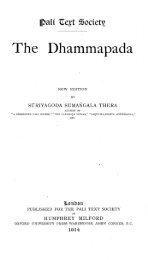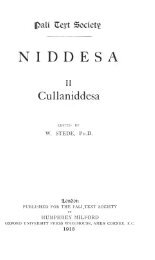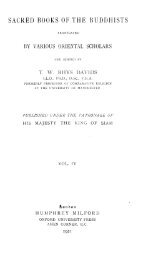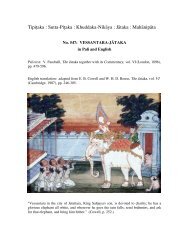Lessons In Practical Buddhism - Sirimangalo.Org
Lessons In Practical Buddhism - Sirimangalo.Org
Lessons In Practical Buddhism - Sirimangalo.Org
Create successful ePaper yourself
Turn your PDF publications into a flip-book with our unique Google optimized e-Paper software.
The Buddha taught that inside of all of us we have three<br />
things that we would be better off without; three defilements<br />
that exist in our minds and are the cause for all of our<br />
suffering. <strong>In</strong> English, these are translated as greed, anger,<br />
and delusion, as sort of approximate names for them. Greed<br />
means any sort of partiality in favour of something, anger is<br />
a name for any partiality against something, and delusion is<br />
the misunderstanding that leads us to be partial towards or<br />
against something.<br />
These three mind states are the problem the Buddha’s<br />
teaching attempts to address. They are a problem because,<br />
as the Buddha pointed out, the nature of reality is that<br />
nothing in the world can possibly satisfy us; clinging to<br />
anything will only lead to suffering. Aversion towards<br />
anything will likewise only result in stress, despair, and<br />
suffering. There is nothing in the universe we could strive for<br />
or against that would bring us peace, happiness and freedom<br />
from suffering once it was obtained. Our beliefs to the<br />
contrary are only due to delusion or misunderstanding.<br />
The reason why no object of our experience can bring us true<br />
happiness and peace is because there exists another set of<br />
three realities that are present in every experience and<br />
render all experience incapable of bringing satisfaction.<br />
These three realities are impermanence, suffering and<br />
non-self. Impermanence means instability, being subject to<br />
change; suffering means being unable to satisfy; non-self<br />
means being not subject to one’s control. These three things<br />
are called the three universal characteristics and can be<br />
verified through the correct practice of insight meditation.<br />
Our partiality towards certain experiences is invariably due<br />
to the belief that they carry the three opposite<br />
characteristics: that they are stable, satisfying, and subject<br />
to our control. We expect, hope, and strive to make our<br />
experience conform to these expectations: stable, satisfying<br />
and controllable. The reason why nothing in our experience<br />
could ever bring us peace, happiness, and freedom from<br />
suffering is that there is nothing in the universe that<br />
possesses any of these three characteristics. This is where<br />
all of our misunderstanding lies. When we talk about<br />
delusion, the misunderstanding that leads to partiality, we<br />
97












